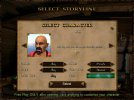Thanks for that - I'll add that file to the next update along with the rest of your work.I detected an error in my translated file of Lady Barbara Wellesley in the history of FreePlay. The \n character on line 18 is missing.
In English:
"Because, sir, the British packet I was sailing in was captured months ago by the Spaniards. I was their prisoner until the alliance.\nAnd
In my translation into Spanish:
"Because, sir, the English packet in which I was sailing was captured months ago by the Spaniards. I was their prisoner until the alliance. Y
I have added and corrected the missing character and added minor improvements to the file translation.
Because of this project, I do now know a word of Spanish. And so I'm going to have to figure out a use for a character named Big Bad Ron, which in Spanish translates to Gran Ron Malo (according to Google Translate). The name has little meaning in English, but "Ron" is Spanish for "Rum".















